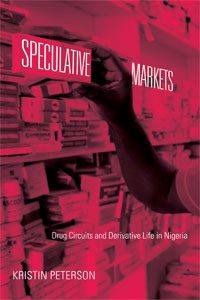 Speculative Markets: Drug Circuits and Derivative Life in Nigeria. Duke University Press, 2014.
Speculative Markets: Drug Circuits and Derivative Life in Nigeria. Duke University Press, 2014.
Speculative Markets describes a once thriving brand name pharmaceutical market in Nigeria that transformed into one of the world’s worst fake (and inefficacious) drug problems. This project begins in the 1970s when Nigeria’s oil boom propelled the country into unprecedented wealth – in contrast to a U.S. and global economic recession at that time. During this period, U.S. and European multinational companies turned to Nigeria to manufacture drugs and sold them on what was then a significant and important foreign market in terms of sales. By the 1990s, proprietary drug markets in Nigeria and throughout Africa were completely eviscerated and relocated elsewhere. What was once almost exclusively a proprietary drug market is now home to mostly imported pharmaceuticals throughout the world.
Speculative Markets analyzes the rise and fall of this West African drug market through several different registers. The project situates these changes within the larger global economic and financial changes at the time, especially the International Monetary Fund’s structural adjustment programs and U.S. monetary and legal policies that were critical to the extended commercialization of the biotechnology and pharmaceutical industries. I argue that the dispossession of Nigerian proprietary drug markets combined with new iterations of speculative capital, was decisive in reshaping the conditions of the drug industry on a global scale.
The book rethinks African markets in the aftermath of widespread dispossession. Ethnographically, I begin with several historical convergences that made it possible for the control over national drug distribution to switch from pharmacists and North American and European multinational drug companies to Igbo traders (from the Eastern part of Nigeria) and generic companies located mostly in China and India. Rebuilding the market was initiated by the international narcotics trade and clever transnational money laundering schemes that not only gave rise to altered global trading circuits, but importantly, to new social lives and market formations within Nigeria. Pharmaceuticals were largely ejected out of formal trading circuits and relocated to legally defined “illicit” markets that grew tremendously in the interstices of urban space with the onset of liberalization. Focusing on one significant market in Lagos called Idumota, where I conducted extensive ethnographic work, the very ontology of these markets are constantly questioned within sites of exchange and indeed the courts – are they legal? illegal? can they be called markets? I show how new state regulation at that time in a highly deregulated environment got deployed as a tool to make claims over who is entitled to control this enormous market. Moreover, inside the market itself, labor, credit, debt, and price all encountered new scaling and forms of valuation. I elaborate on how these are fused with the consistent need for actors to gauge daily encounters with economic and social risk. It draws on the term “speculation” again only this time to think through the various calculations that one employs to make it through the day – what I refer to as “derivative life.”
As the Nigerian pharmaceutical market amounts to roughly $2 billion per year, I describe the market as comprising drugs that make up “indeterminate chemistries.” These include a multitude of intentionally adulterated fake drugs, substandard products, dumped inefficacious drugs, and good quality generics that are pumped into unofficial markets from around the world. As a result, there are huge concerns over drug safety, which contribute to organizing social lives within drug markets. Moreover, multinational brand name companies compete alongside generic companies by selling simple drug formulations and over the counter medication like aspirin and multivitamins, rather than marketing more complex formulations for hypertension, HIV, and cancer. Through ethnographic work, I learned how pharmaceutical marketers invent drug markets and help to develop the contours of market structure. My findings suggest that drug marketing in Nigeria and West Africa are key to securing monopolies in pharmaceutical markets located in Europe and North America for multinational companies.
Overall, drug companies profoundly reorganized pharmaceutical markets at a global scale when new infrastructures for financial speculative practices became available to them (such as the launch of the NASDAC; the creation of a globally harmonized intellectual property law that protects both research and marketing). Speculative practices lead to new forms of volatility and risk that equally lead to decisions that dispossessed some drug markets while consolidating others – a classic form of racial capitalism. It is not simply that African drug markets are not profitable – indeed the Nigerian market is profitable. But rather, in hedging new risks, which meant pursuing monopolies in the name of survival, speculation rendered African markets unnecessary for the industry. As such, I am interested in resituating how we think about global economic crisis and the non-equilibrium theories of neoliberalism that speculates on anticipated volatility and uncertainty in the marketplace.
Awarded
*Anthony Leeds Book Prize, 2015; Society for Urban, National & Transnational/Global Anthropology, American Anthropological Association
*Gold Medal: Independent Publishers National Book Award, 2015 (Category: Current Events I: Political/Economic/Legal/ Media)
*Books of the Decade, Editors’ Picks, Duke University Press.